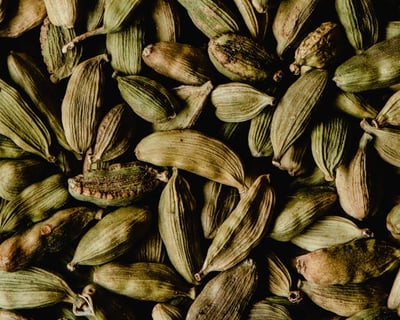

Cardamom, often celebrated as the "Queen of Spices," is a fragrant and highly valued spice native to the lush, tropical forests of South India, particularly the Western Ghats. Its scientific name is Elettaria cardamomum, belonging to the ginger family (Zingiberaceae). With a history spanning millennia, cardamom has played a pivotal role in Indian cuisine, traditional medicine, and global trade, its captivating aroma making it one of the world's most expensive spices by weight.
Historically, cardamom's use in India dates back to ancient times, with mentions in Vedic texts as "ela" (एला) and its widespread use in Ayurvedic medicine. It was integral to the ancient spice routes, traveling across continents and influencing diverse culinary traditions. Today, India remains a significant producer of this cherished spice.
Cardamom is known by various names, reflecting its widespread cultural integration:
Hindi: Elaichi (इलायची)
Malayalam: Elakka (ഏലക്ക)
Tamil: Yelakkai (ஏலக்காய்)
Kannada: Yelakki (ಏಲಕ್ಕಿ)
Spanish: Cardamomo (car-dah-MOH-moh)
French: Cardamome (car-dah-MOM)
German: Kardamom (CAR-dah-mom)
Italian: Cardamomo (car-dah-MOH-moh)
Chinese (Mandarin): 豆蔻 (dòu kòu) (doh koh) or 白豆蔻 (bái dòu kòu)
Japanese: カルダモン (karudamon) (kah-roo-dah-mon)
Arabic: هَال (hāl) or هَيْل (hayl) (hal / hayl)
Here are some of the key health benefits of cardamom:
Aids Digestion: Cardamom is well-known for its ability to promote healthy digestion. It stimulates digestive enzymes, which helps in the breakdown of food, reducing issues like bloating, gas, indigestion, and acidity. It can also be soothing for stomach discomfort.
Antioxidant Powerhouse: This spice is rich in antioxidants, which are crucial for fighting free radicals in the body. Free radicals can cause oxidative stress and cellular damage, leading to various chronic diseases. The high antioxidant content in cardamom helps protect cells and may contribute to overall well-being.
Anti-inflammatory Effects: Cardamom contains compounds with anti-inflammatory properties that can help reduce inflammation in the body. Chronic inflammation is linked to numerous health problems, so incorporating anti-inflammatory foods like cardamom can be beneficial.
Supports Respiratory Health: Traditionally used in Ayurvedic medicine, cardamom is believed to be beneficial for respiratory issues. It may act as an expectorant, helping to clear mucus and relieve congestion, and its anti-inflammatory properties can soothe respiratory passages, making it useful for conditions like coughs, colds, and even asthma.
Promotes Oral Health: Cardamom has been used for centuries as a natural breath freshener. Its antibacterial properties can help fight oral bacteria that cause bad breath, cavities, and gum disease, contributing to better oral hygiene. Chewing cardamom seeds can also increase saliva production, which helps cleanse the mouth.
Detoxification: Cardamom acts as a natural detoxifier, aiding the body in flushing out toxins and waste.
While cardamom offers a wide array of potential health benefits, it's generally safe for consumption in culinary amounts. If considering it for therapeutic purposes, especially in larger doses or as a supplement, it's always advisable to consult a healthcare professional, particularly if you have underlying health conditions or are on medication.
Regarding our cardamom offerings, we provide cardamom seeds, cardamom powder, and cardamom pods. The cardamom pods are graded by size, with common dimensions being 5-6 mm, 7-8 mm, and 9-10 mm
Cardamom
Medical Disclaimer
This information is for general knowledge only and isn't medical advice. It's not a substitute for professional medical consultation. Always consult your doctor or another qualified healthcare provider with any health concerns or before starting any new treatment.
Services
Exporting quality Indian spices, oils and trade services.
© 2025. All rights reserved.
contactusgtsi@gmail.com
Coming Soon
GST NO: 27abcfg5560a1ZR IEC : abcfg5560a
